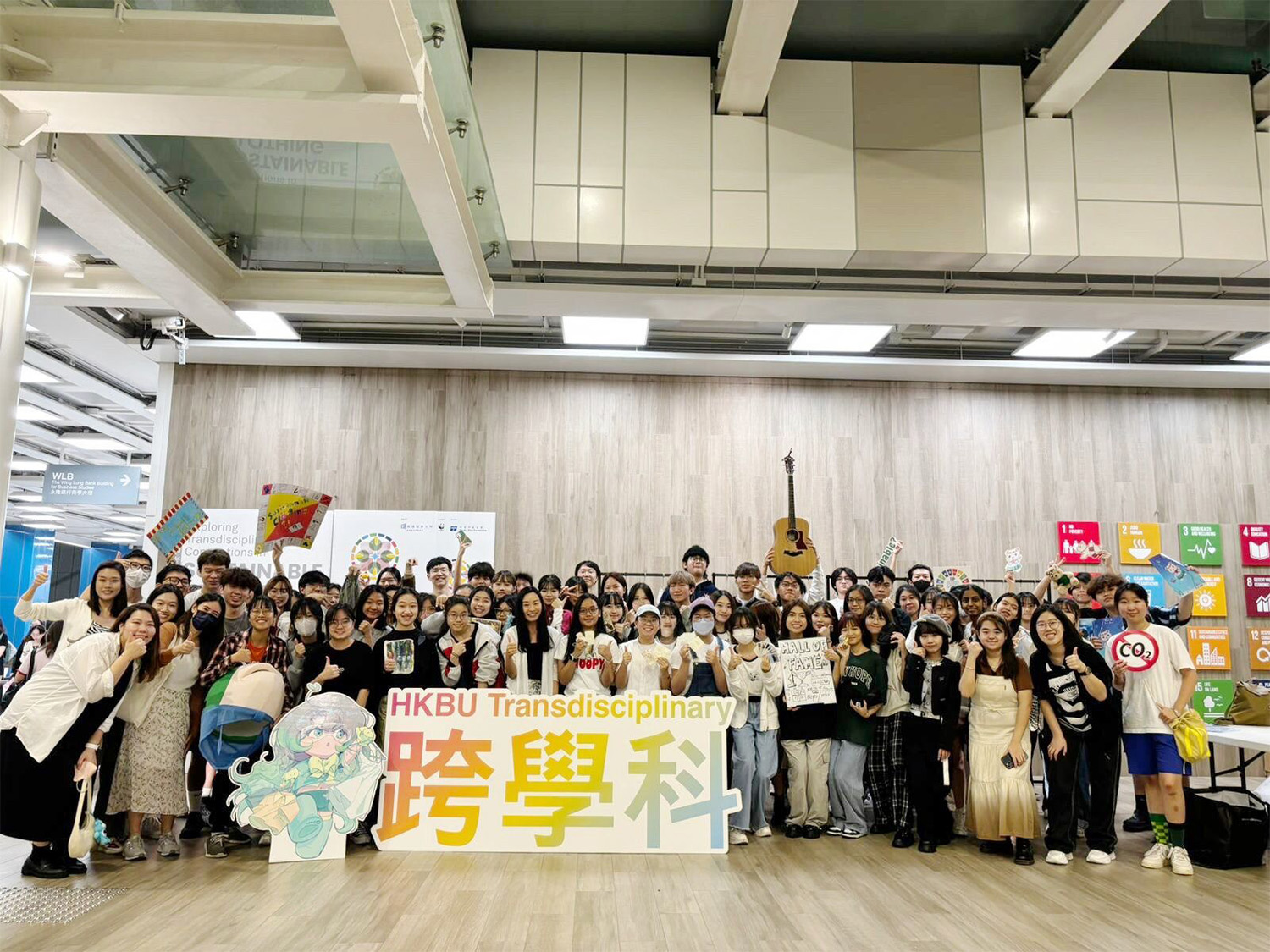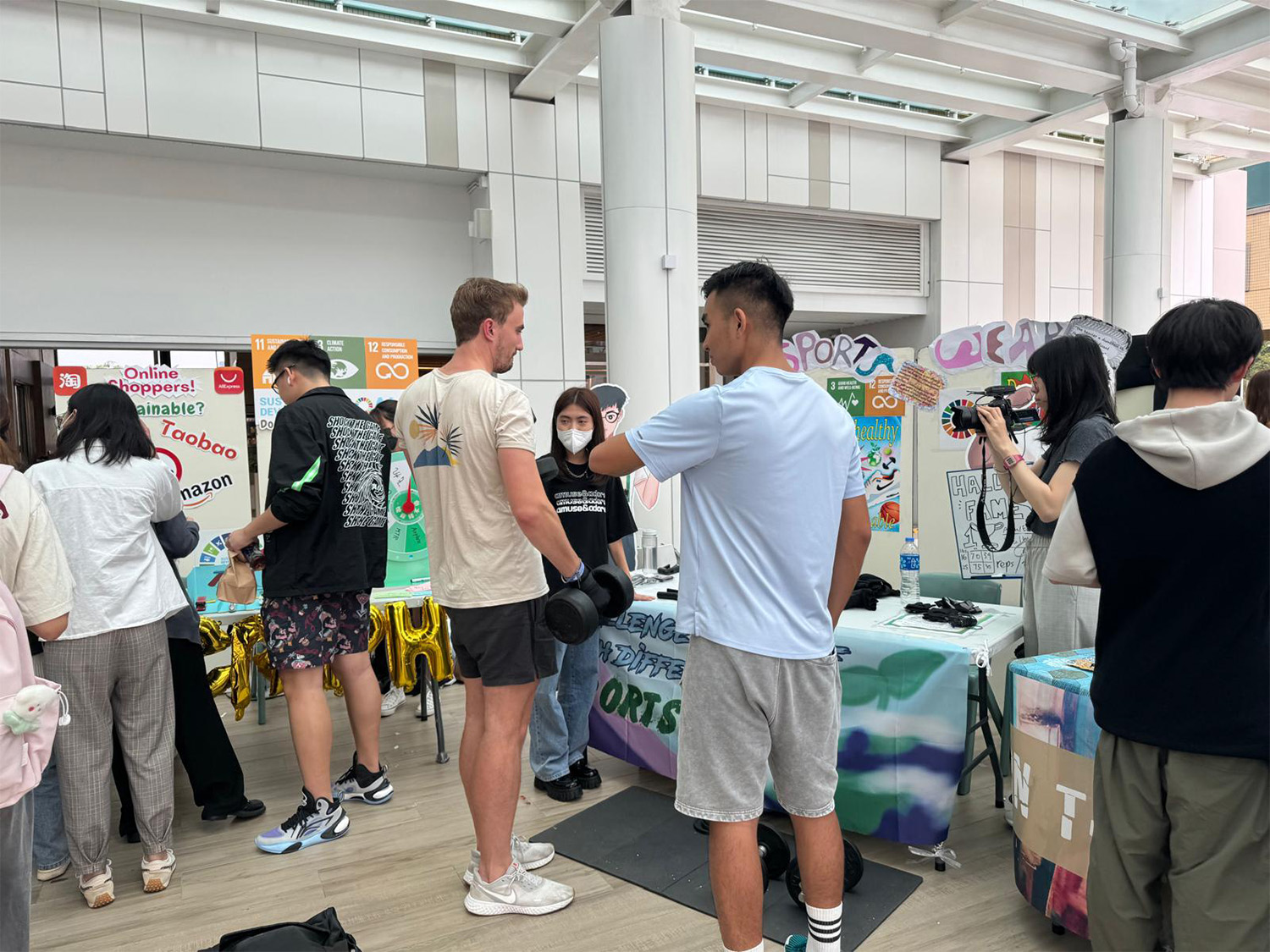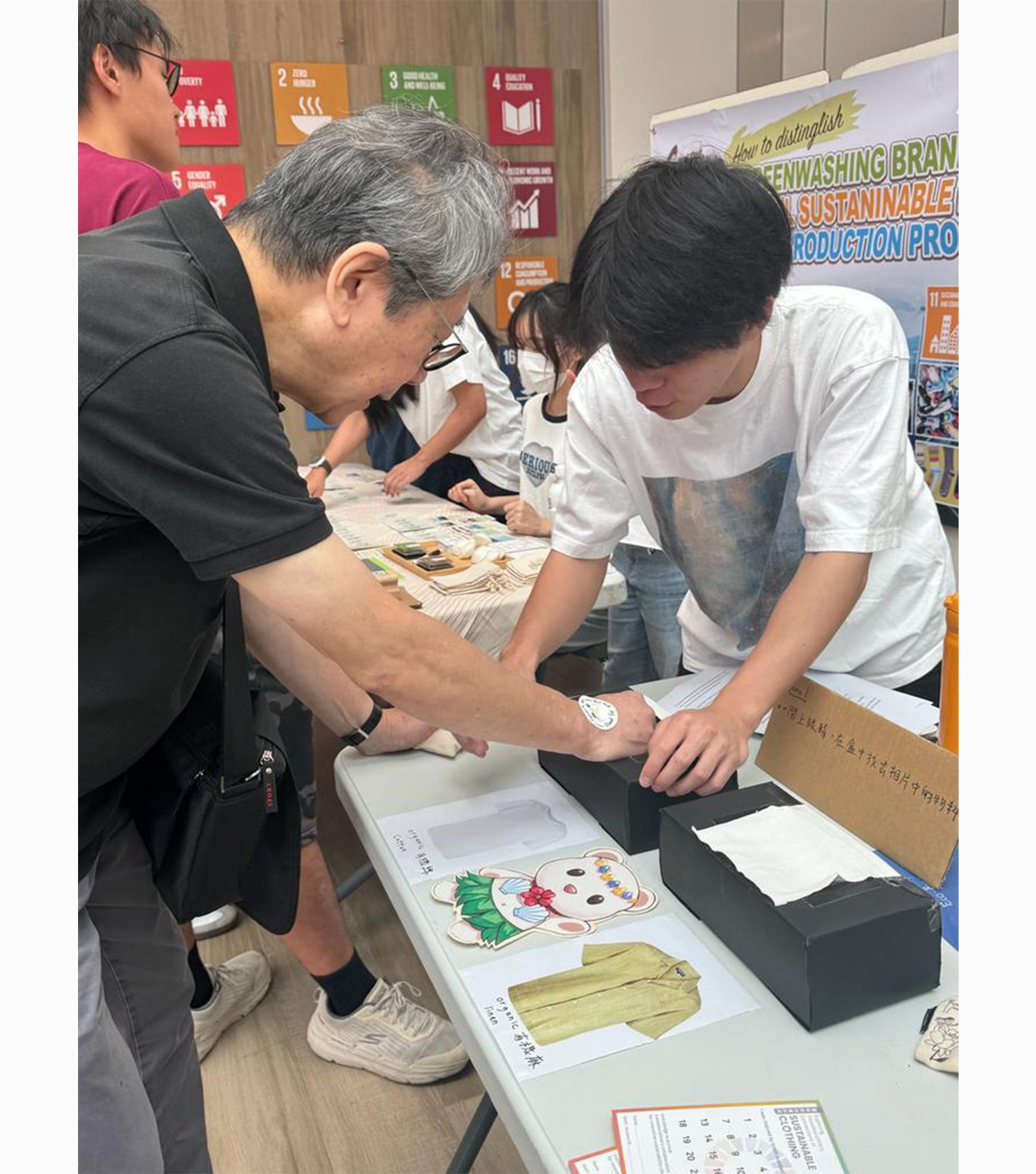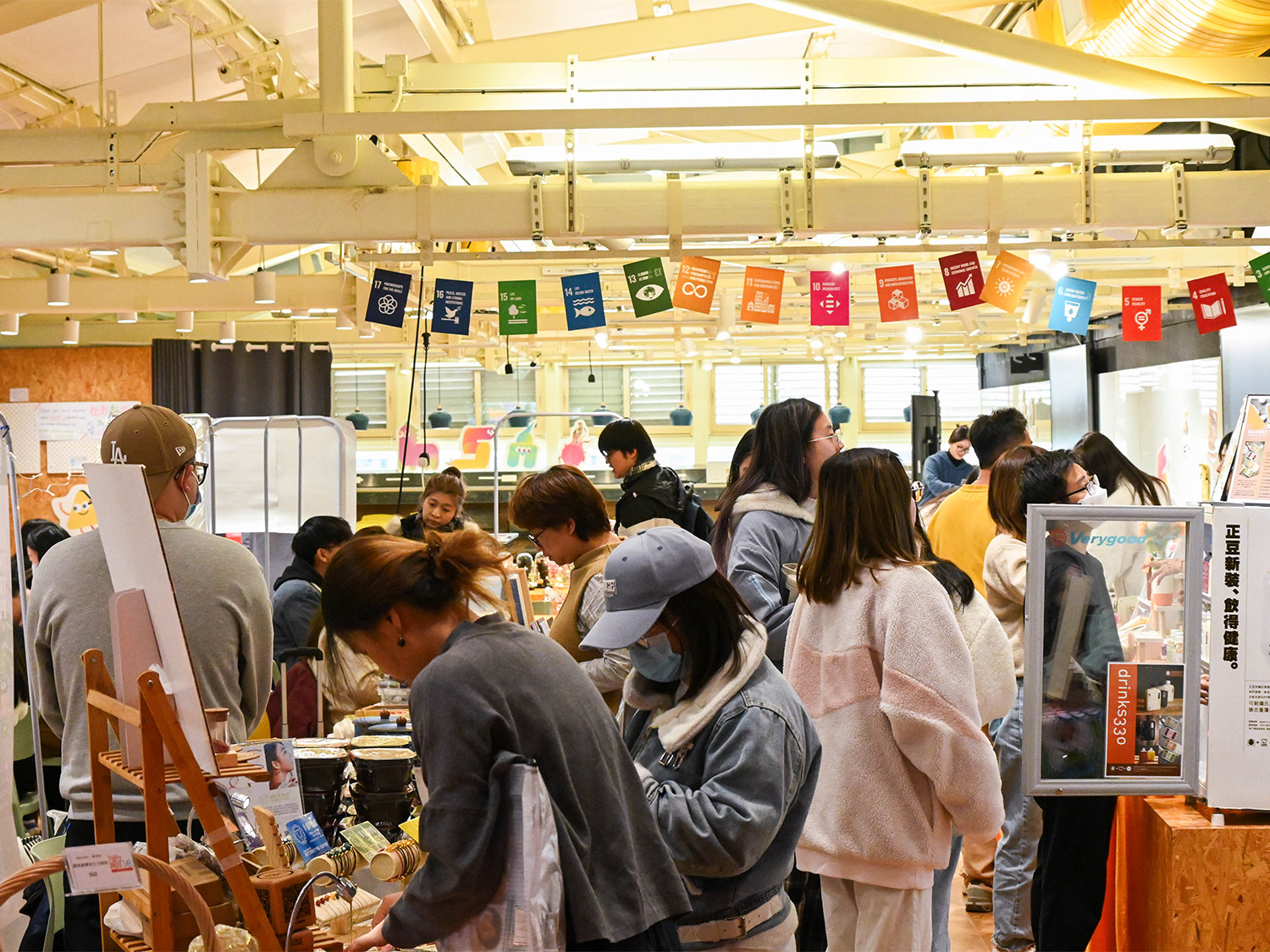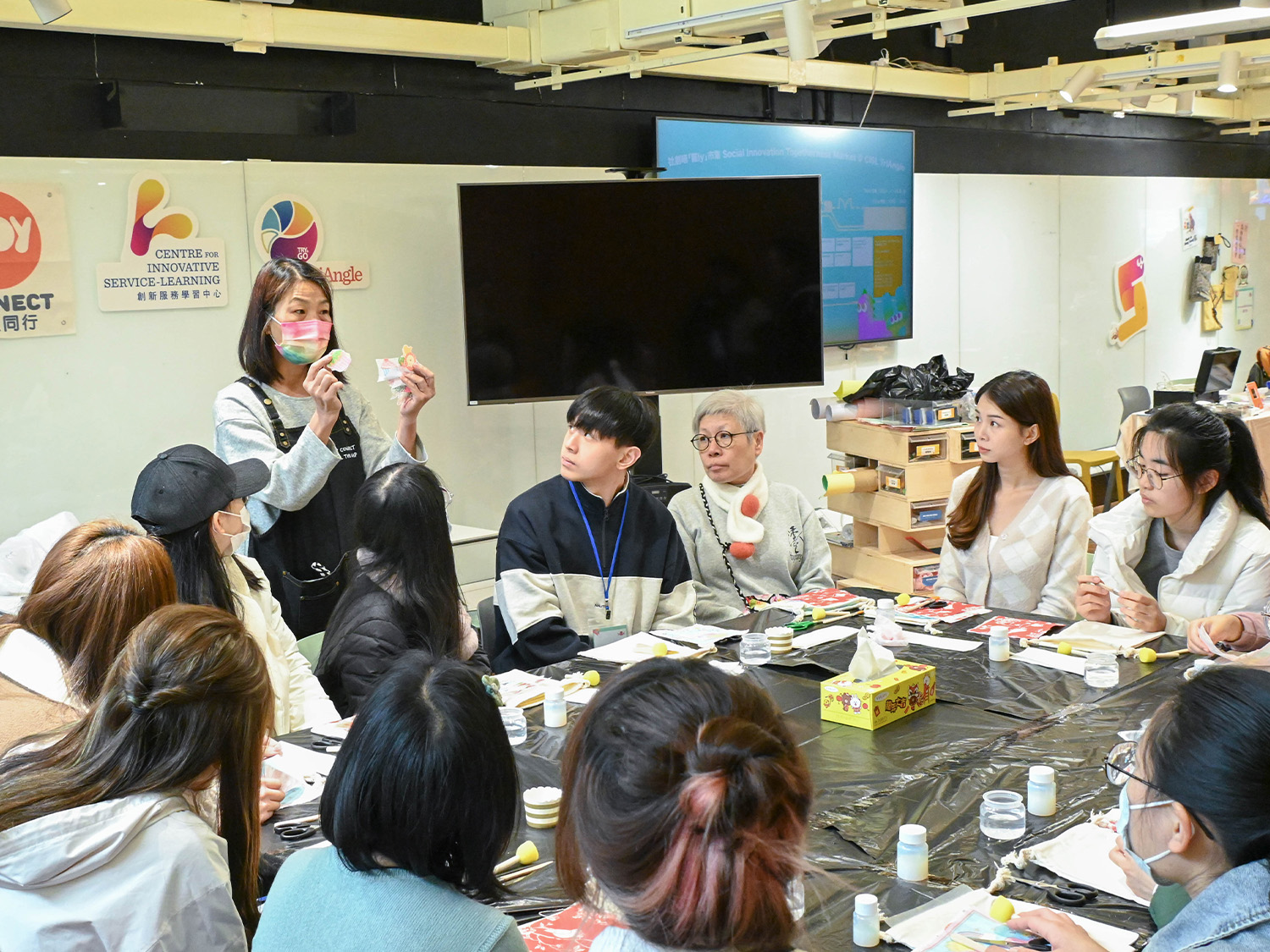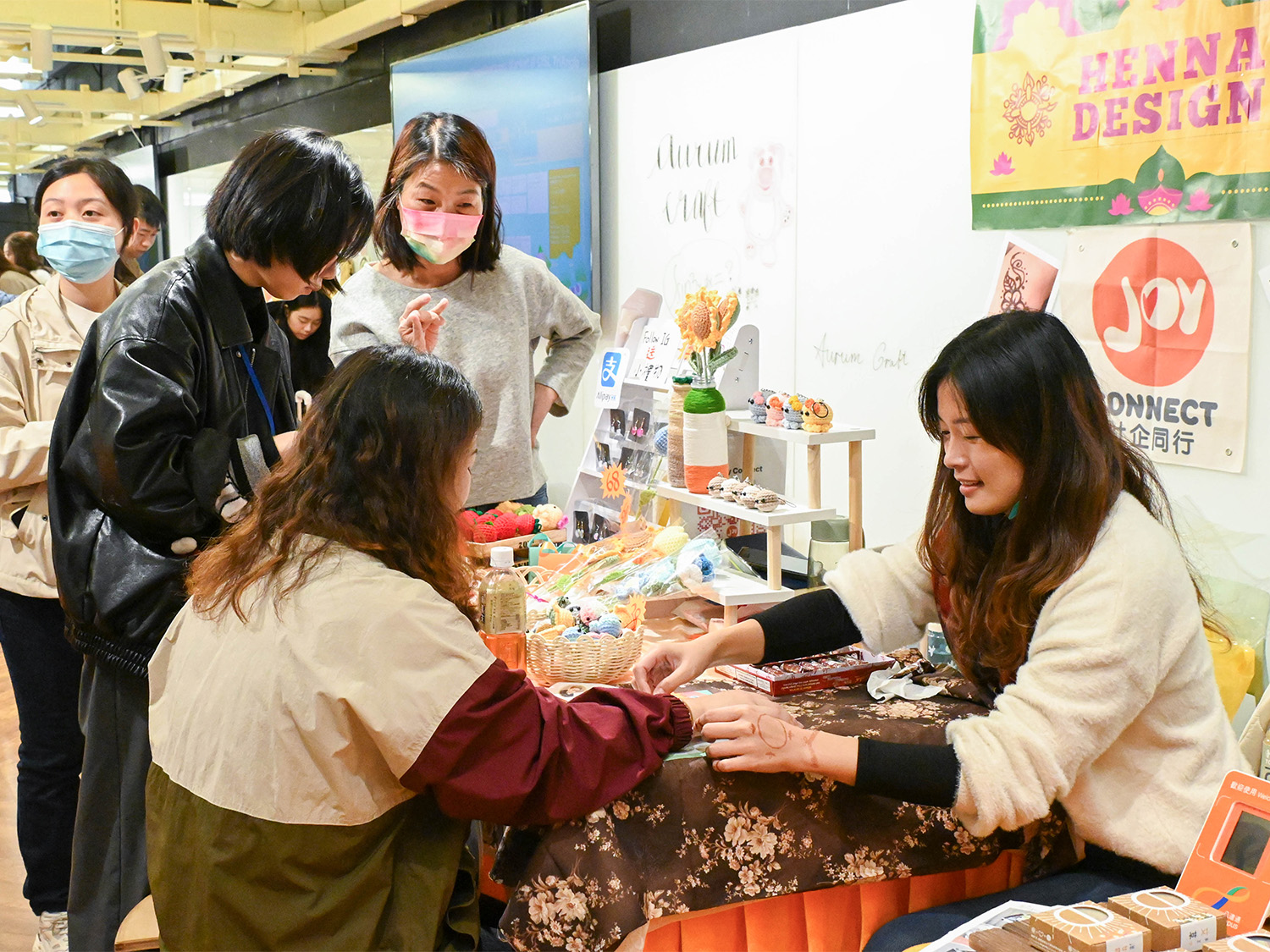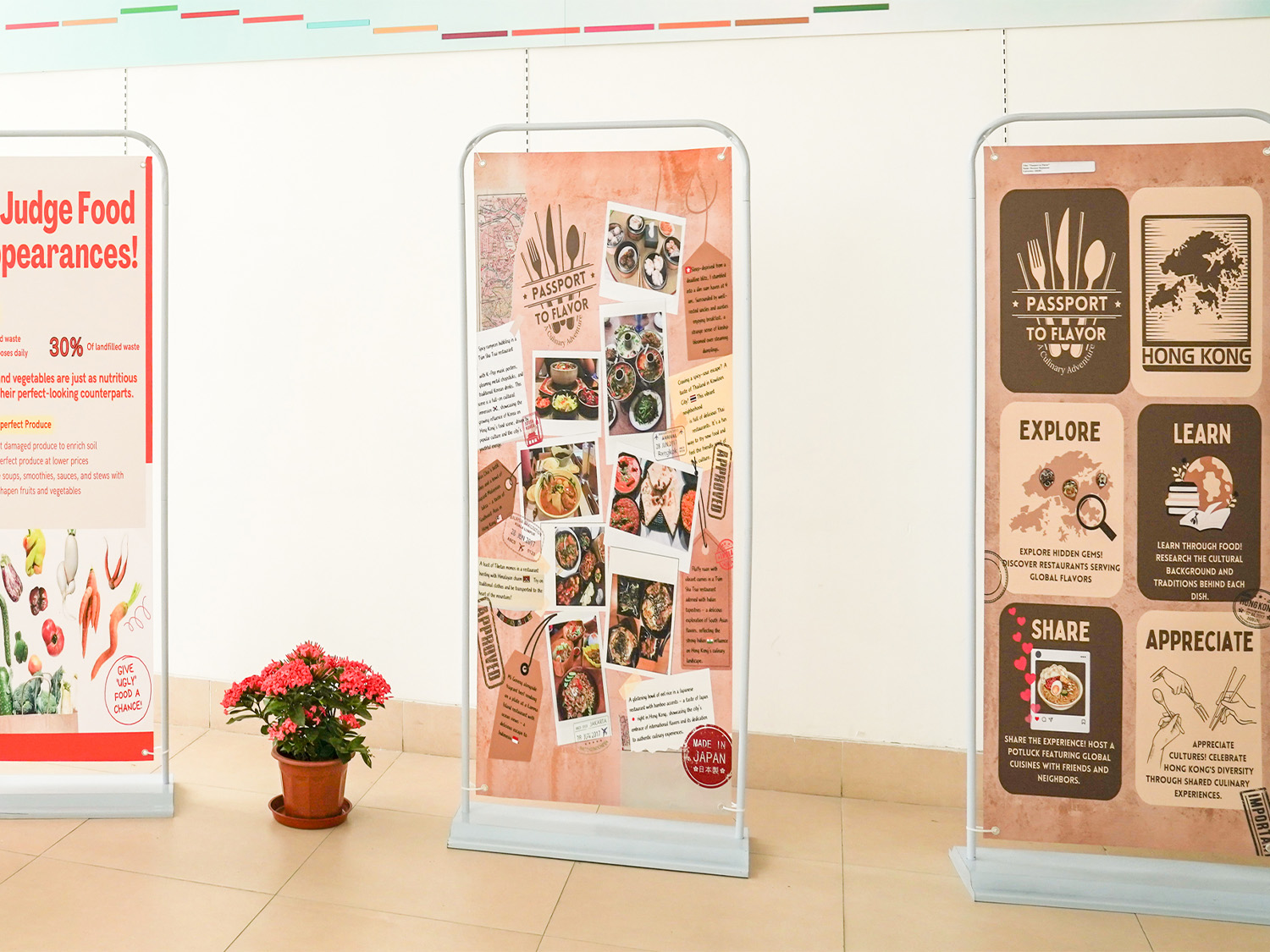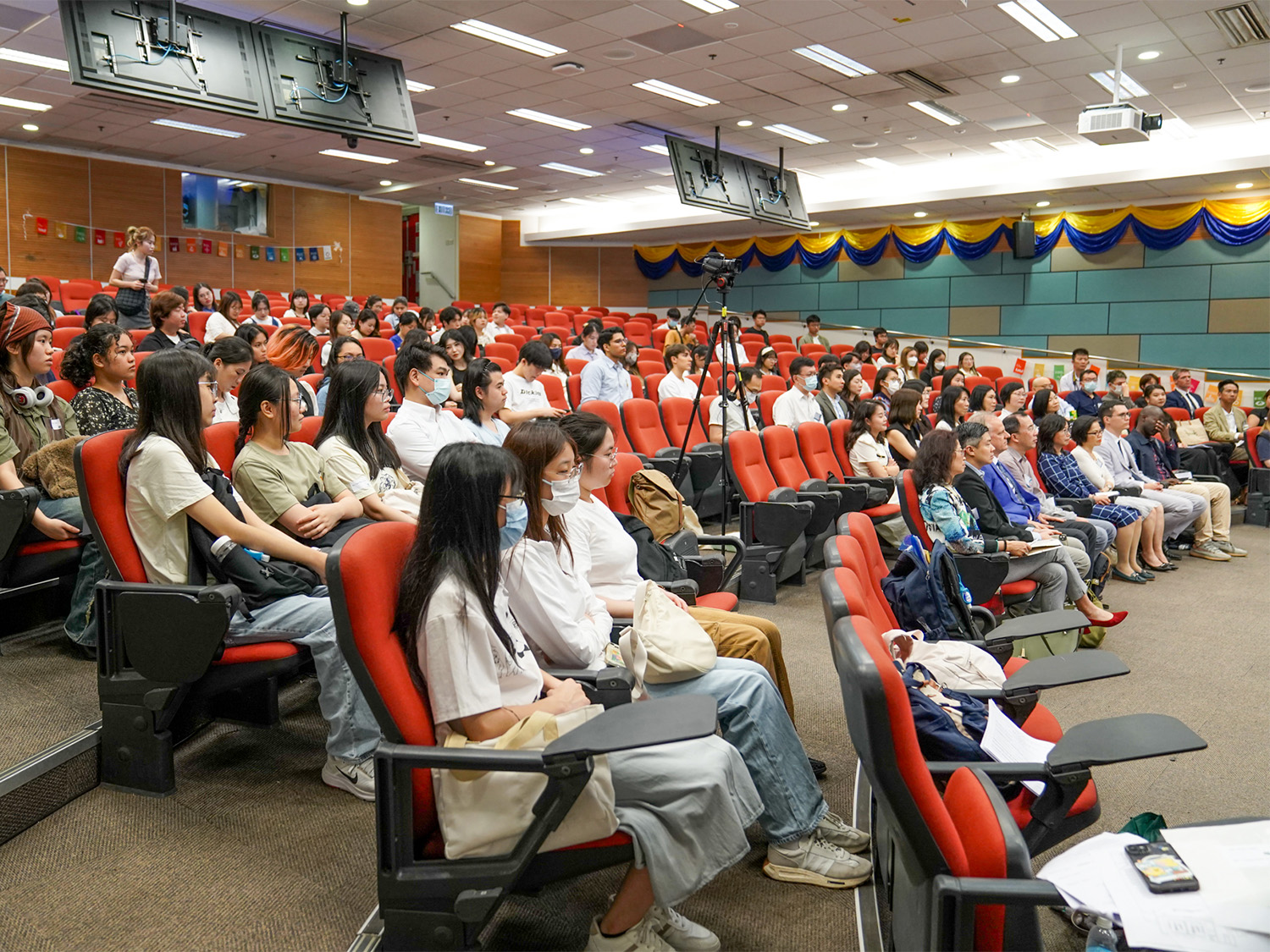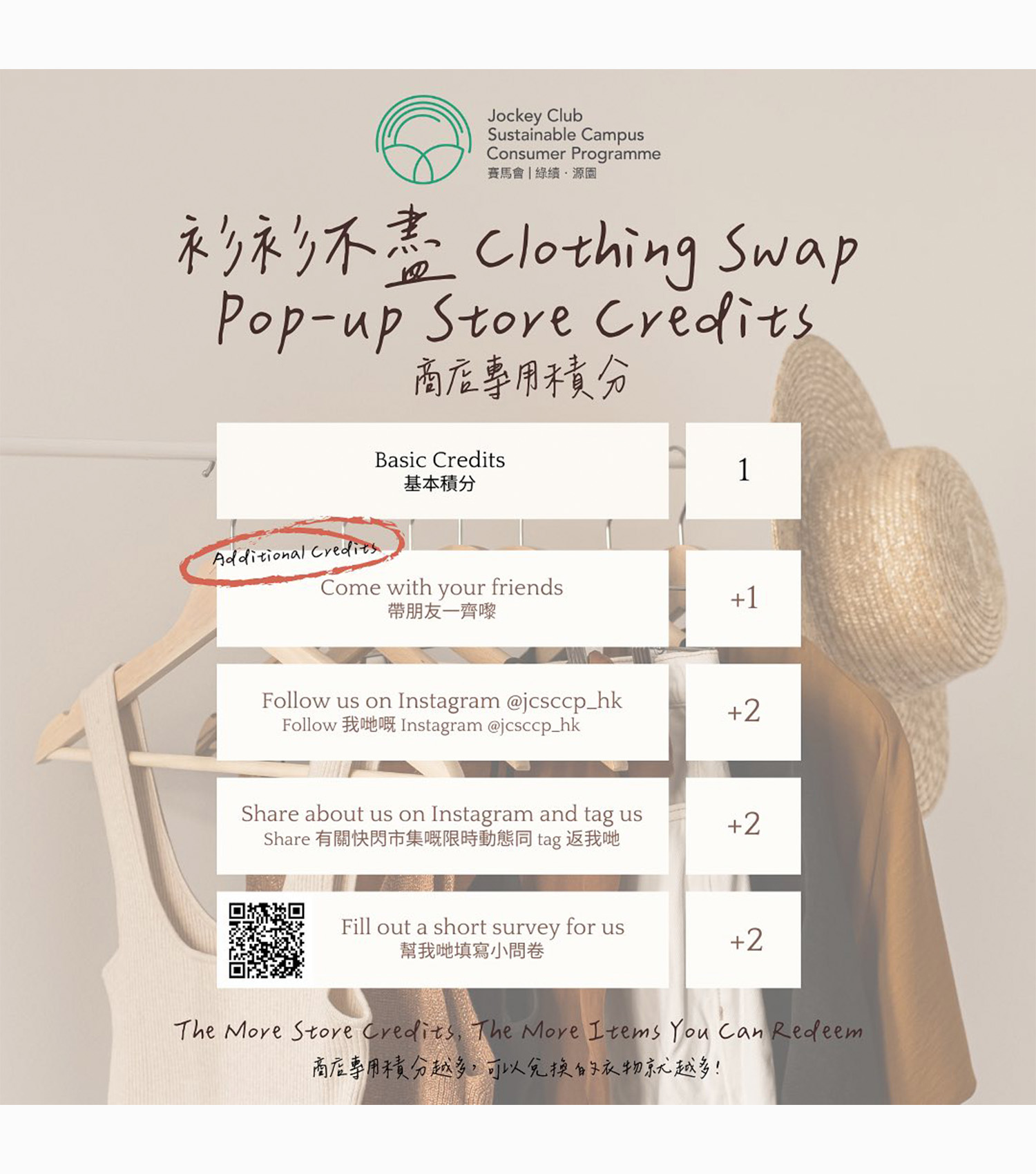SDG 12: Responsible Consumption and Production
Recognising that no global problem can be effectively addressed through a single discipline, a group of 143 first-year students in the course "Global Challenges I" embraced the role of transdisciplinary collaborators to tackle issues surrounding sustainable clothing. Dr Glos Ho, Principal Lecturer from the Division of Transdisciplinary Undergraduate Programmes, led the project. The students participated in guest seminars and fieldwork in Hong Kong and Macau to gain comparative insights into the topic, enabling them to independently evaluate the issue. Subsequently, the students worked in teams to conduct interviews with 12 faculty members from various disciplines at the University. As part of their assessment, the students set up 22 booths on the campus to educate the University community on the collaborative efforts of disciplines in promoting responsible consumption and the production of sustainable clothing.
Joyful giving through a market carnival for social good
TriAngle of the Centre for Innovative Service-Learning, in collaboration with local social enterprises and teams of students from the University, hosted the “Social Innovation Togetherness” Market Carnival from 25 to 26 January 2024, as a celebration of the Chinese New Year with the HKBU community and the public. This event featured 23 stalls by HKBU students and local social enterprises, showcasing a variety of creative, festive and sustainable products, attracting over 1,600 attendees. In addition, several HKBU’s student social innovation teams and projects were highlighted. They included Bio-Leisure, Stote, and Soften Gravity, which promoted harmonious ecological relationships, upcycling of fashion, and mental health through their respective endeavours. The event provided a platform for direct exchanges between the student teams with social enterprise founders and the public, offering valuable feedback and inspiration to refine their services and products.
Empowering youth through digital storytelling for global goals
"Youth in Digital Activism: Global Citizenship Advocacy Contest" was hosted by the Language Centre for all students of the UGC-funded universities keen to promote sustainability practices in line with the SDGs. Approximately 150 participants attended the contest award ceremony on 26 May 2024. Professor Karen Cheung, President of UNESCO Hong Kong Association, delivered the keynote address. Students submitted works advocating for SDGs through various mediums, including short videos, photo essays, or creative art, with themes ranging from sustainable consumption to gender equality. Winners effectively communicated positive messages to the public and advocated practical changes to the community in an engaging, creative, and persuasive way.
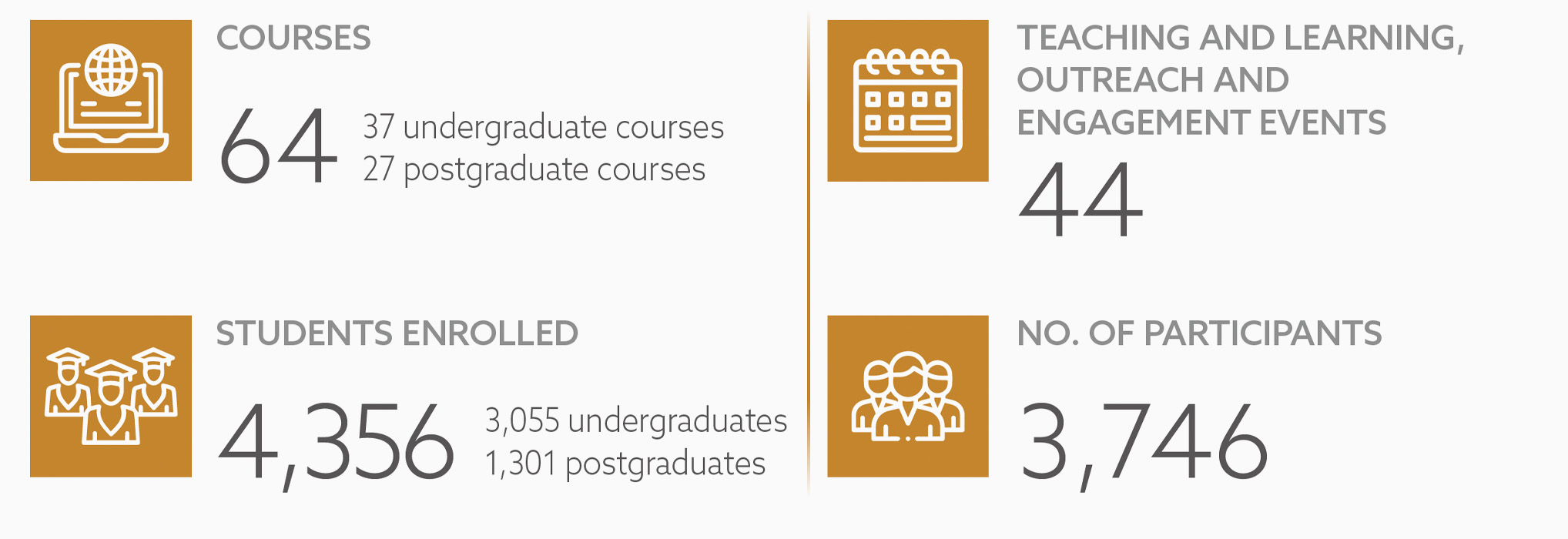

Department of Physics
Authors: Zhuangmiao WANG, Yu TANG, Feng GAO, Xiaopeng QIU, Furong ZHU*
*Corresponding author
With good penetration ability, near infrared (NIR) is widely used for detecting chemical compositions of food, Chinese medicinal material and other organic matter by measuring their spectral fingerprint. For example, it can estimate the sugar levels in fruits through monitoring the change in NIR absorption by sugar molecules in the fruits. However, NIR signals collected from fruits planted outdoor may not be accurate enough to evaluate their quality, as the conventional sensors response to both visible and NIR light.
Professor Zhu and his team have invented a novel visible/NIR dual-mode sensor technology that can detect visible light or NIR light selectively without interference. The team has developed a portable Fruit Quality Detector that picks up NIR signal accurately even in the brightest ambient light conditions. The results can be compared with its own database through an algorithm, to calculate the fruit quality, such as sugar content and acidity content, enabling instant portable material analysis and interconnected ecosystem of realtime data integrated with IoT solutions. Further potential applications could be explored in the healthcare domain, enabling improved body management for health screening and blood sugar measurement.
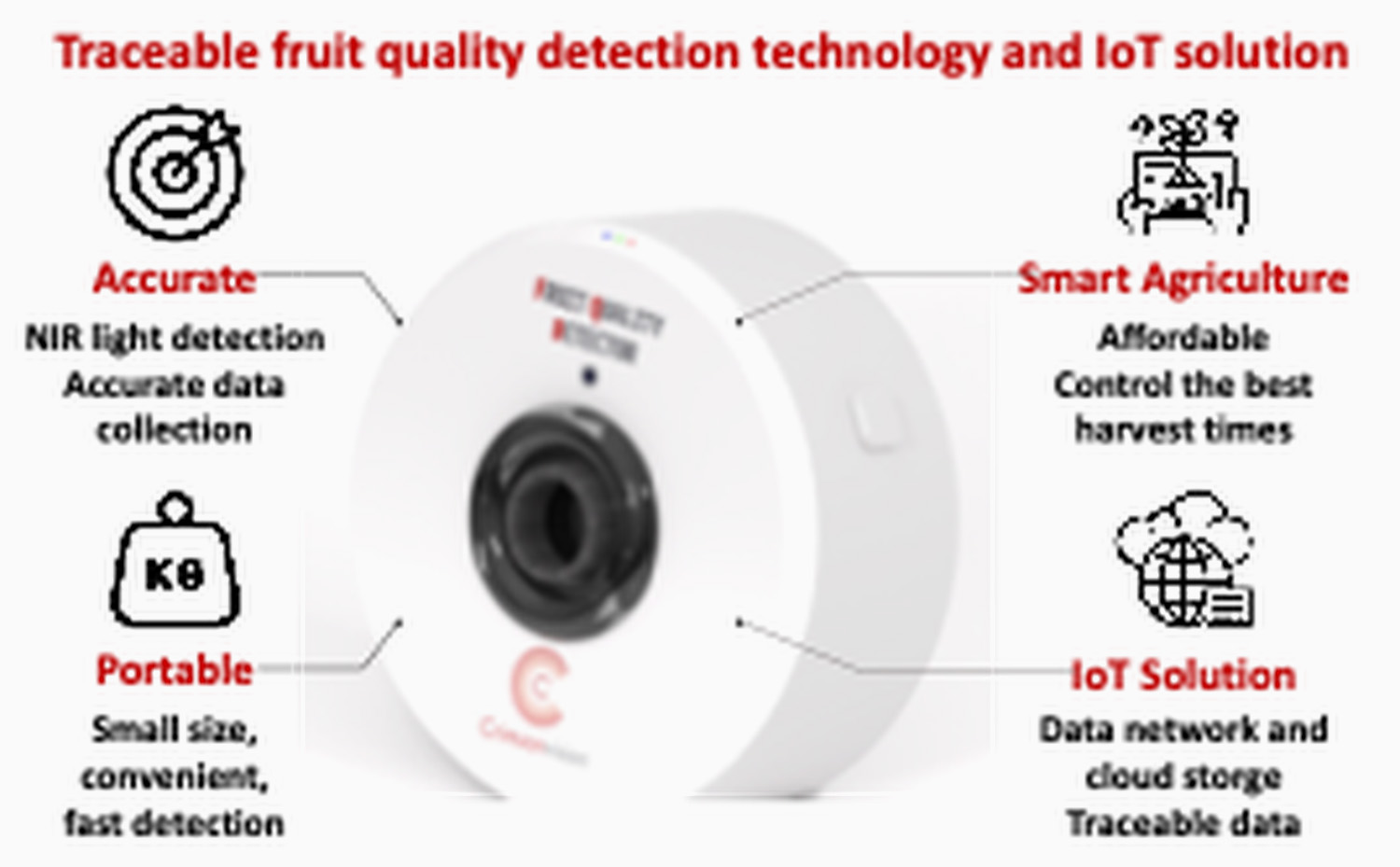

One-pot chitin pulping using recyclable superbase-based protic ionic liquid
Department of Chemistry
Corresponding authors: Qingqing TAO, Felipe Nunes HENRIQUEZ, Kang DING, Wai Lun MAN, Matthew Y.Y. LUI*
*Corresponding author
Chitin is a highly abundant and renewable material that holds significant promise for applications in the biomedical and food industries. It is typically sourced from the discarded shells of food waste, making it an eco-friendly option. However, traditional methods of isolating chitin rely heavily on the use of large quantities of harmful and corrosive chemicals. In this research, the team has developed an innovative chitin isolation process that employs a recyclable ionic liquid. This new method not only reduces the reliance on hazardous chemicals but also yields chitin with enhanced properties compared to commercially available products, making it a more sustainable and efficient alternative.
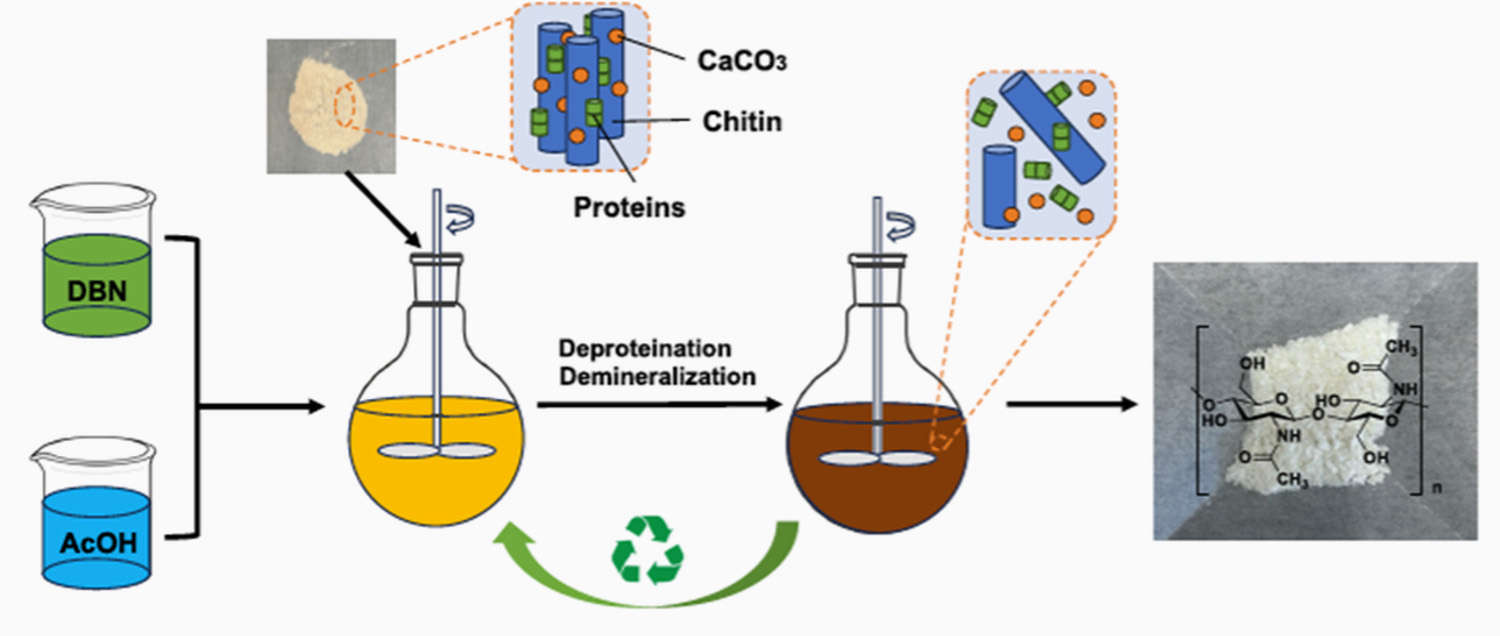

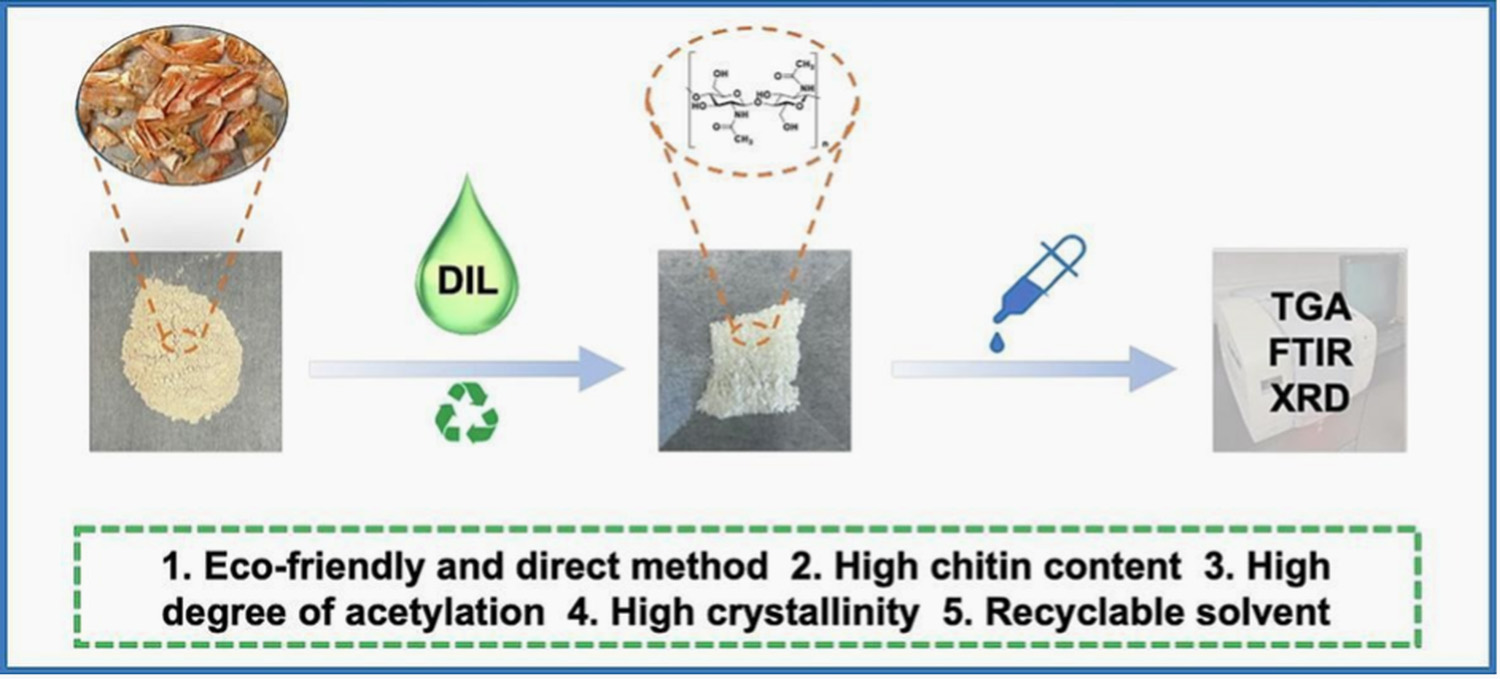

HKBU continues to demonstrate its commitment to ethical sourcing through its comprehensive Sustainable Procurement Policy and Policy on Anti-slavery and Equivalent Rights for Outsourced Workers. These policies ensure all procured products and services meet rigorous ethical standards, prioritising suppliers and partners who support fair labour practices and environmental sustainability. The University's transparent and accountable sourcing practices, along with thorough tender evaluation criteria, actively support ethical businesses, contributing to positive social impacts
Sustainable waste management and recycling initiatives
Aligned with its sustainable campus vision, the University has implemented a Waste Management Policy that emphasises the "Use Less, Waste Less" strategy for resource circulation and sustainable waste management. Dedicated recycling facilities have been set up to drive recycling and reduce landfill waste. Since 2016-17, the University has achieved a 22% drop per capita in municipal solid waste and a 143% increase per capita in recyclables through its sustainable practices, showcasing the University's dedication to a greener environment.
- Streamlining recycling infrastructure: Green Pitch
A key component of HKBU waste management strategy that has transformed the campus recycling infrastructure. The University has replaced all waste bins with a new Green Pitch system, featuring one waste bin alongside four recycling bins. These strategically placed Green Pitch stations act as designated recycling hubs across the campus. The initiative's motto, "Pitch In to Pitch Right," actively engages staff and students, encouraging them to sort and dispose of waste properly at the point of disposal.
- Reward-based smart recycling programme: Green Corner
Launched in October 2023, the Green Corner is a dedicated store featuring advanced recycling bins and a rewards system to encourage recycling among staff and students. Participants can earn points for their recycling efforts, which can then be redeemed for various gifts and rewards. This reward-based programme aims to motivate the campus community to actively engage in sustainability activities.
- To raise awareness and adoption, the University organised a Grand Opening event in October 2023 with a special promotion offering triple rewards points. HKBU staff were on hand to provide guidance on using the smart recycling systems. Soon after, a giveaway event was held after the Chinese New Year holidays at the Green Corner. A booth offered instructions, and recyclers were rewarded with complimentary coffee coupons.
- From October 2023 to June 2024, the Green Corner has collected over 1,800kg of recyclables, showcasing the positive impact and engagement of the campus community. By integrating the Green Corner and the reward-based programme, the University is cultivating a culture of recycling and sustainability, empowering individuals to contribute to an eco-friendlier future.
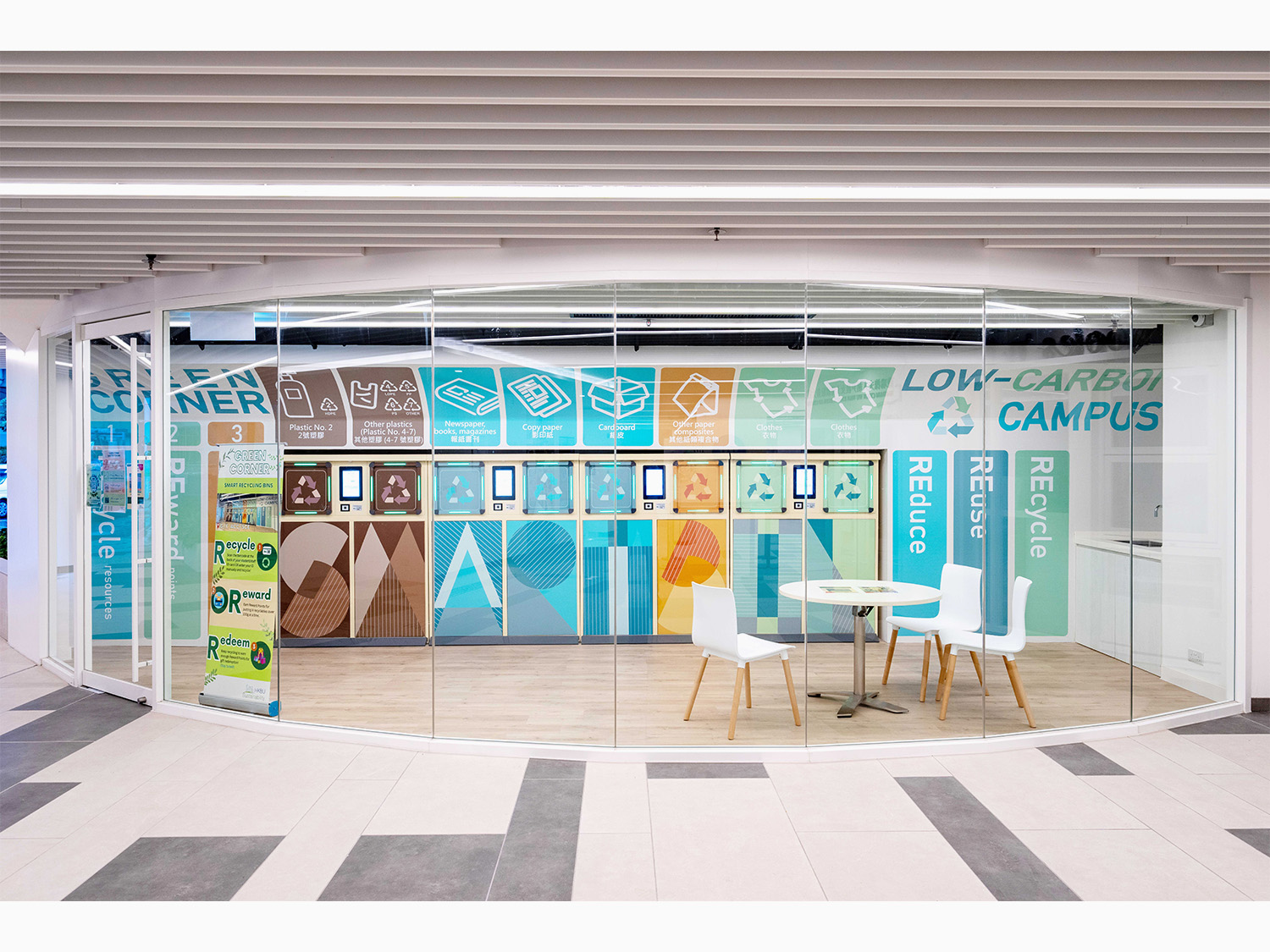

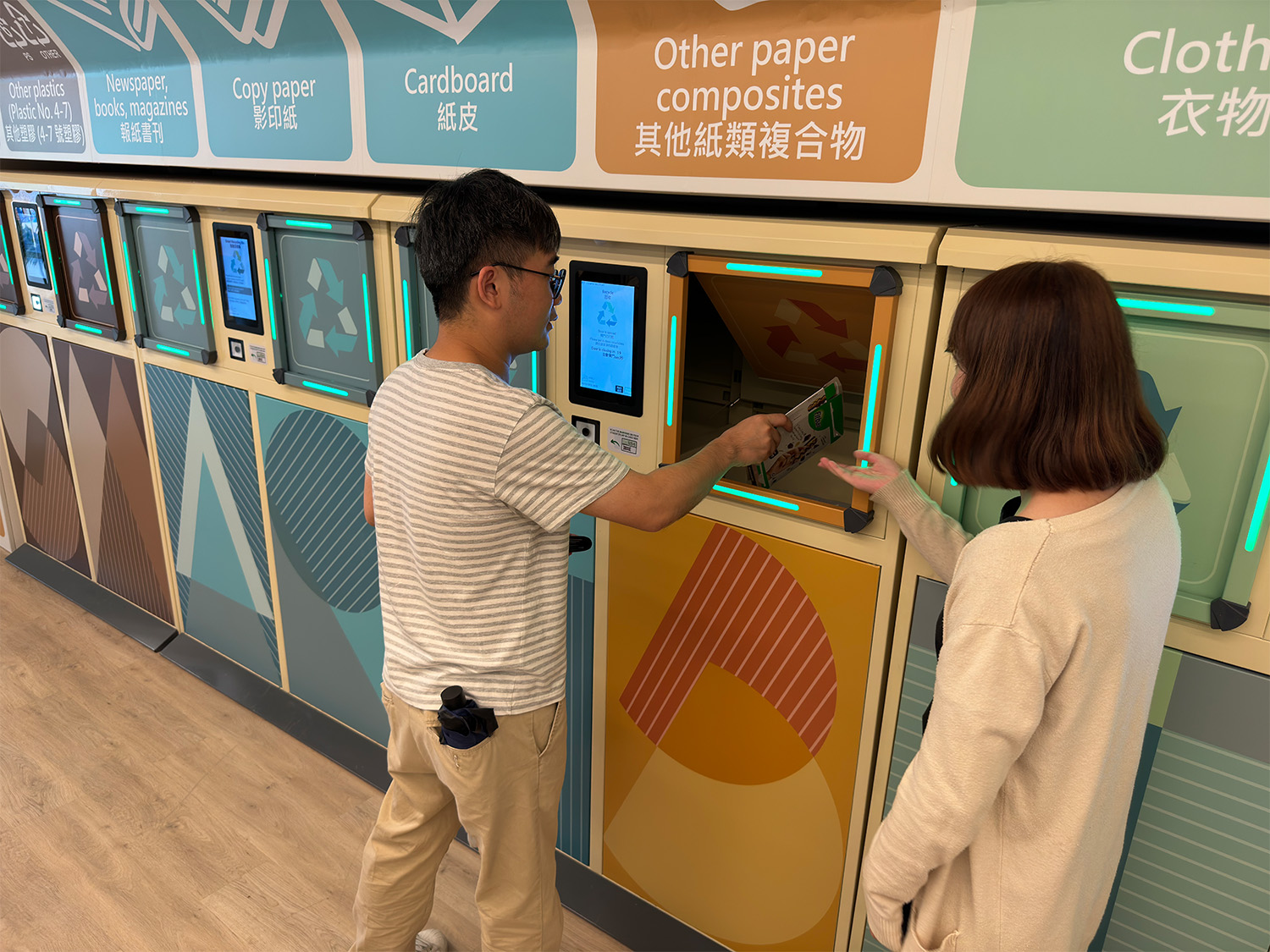

- Reducing paper consumption
Since March 2024, all campus restrooms have ceased providing paper towels. Instead, students and staff are encouraged to bring their own handkerchiefs or use the available hand dryers. This initiative aims to reduce the consumption of paper towels and the associated waste generation, contributing to the University broader sustainability goals.
- Hazardous substances management
The University has implemented a comprehensive regulatory framework to uphold the highest safety and environmental standards in managing and disposing of hazardous substances on campus. This framework is enforced through the University's stringent Dangerous Goods Management System, which is continually improved to maintain robust protocols.
- To address evolving challenges, the University has proactively explored the integration of real-time tracking technology to enhance chemical safety and compliance monitoring. As part of this initiative, the University has implemented radio-frequency identification (RFID) technology for inventory management. This advancement will enable effective tracking of the location and quantity of hazardous substances, ensuring proper storage, usage, and control while mitigating risks associated with unauthorised handling.
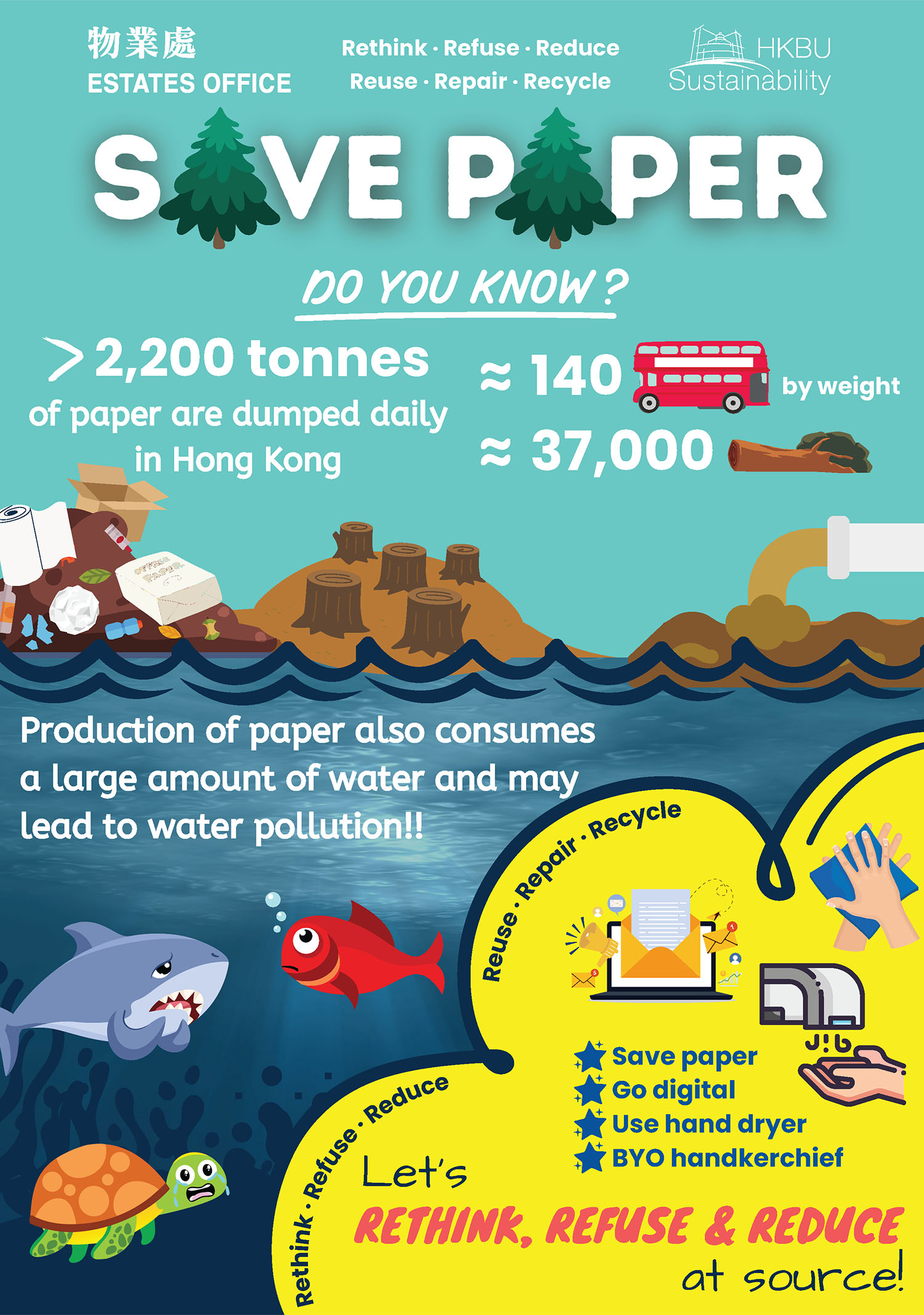

Green catering
Embedded within the University's Waste Management Policy is a commitment to advancing green catering initiatives to curtail the use of plastic and disposable items on campus. Through targeted programmes and awareness campaigns, the University is actively motivating the campus community to embrace eco-conscious practices and reduce their environmental impact.
- Joint-U Lunchbox Lending Programme
A collaborative effort across eight universities to minimise waste from single-use catering containers. This pioneering programme provides a lending service for reusable meal boxes, encouraging the community to borrow and return the containers after use. Since its launch in September 2023 up to June 2024, the programme has facilitated over 2,000 container loans, significantly curbing the consumption of disposable takeaway lunchboxes.
- To enhance engagement with the programme, various initiatives have been implemented. In September 2023, the University recruited student helpers to promote the programme. Building on this, in December 2023, the lunchboxes were distributed as gifts to encourage further participation. The University also partnered with the sustainable lifestyle platform Carbon Wallet, enabling users to earn points for borrowing reusable lunchboxes, which could then be redeemed for eco-friendly rewards. Additionally, a feedback survey was conducted in May 2024, where participants were entered into a lucky draw, helping the University gather insights to improve the programme
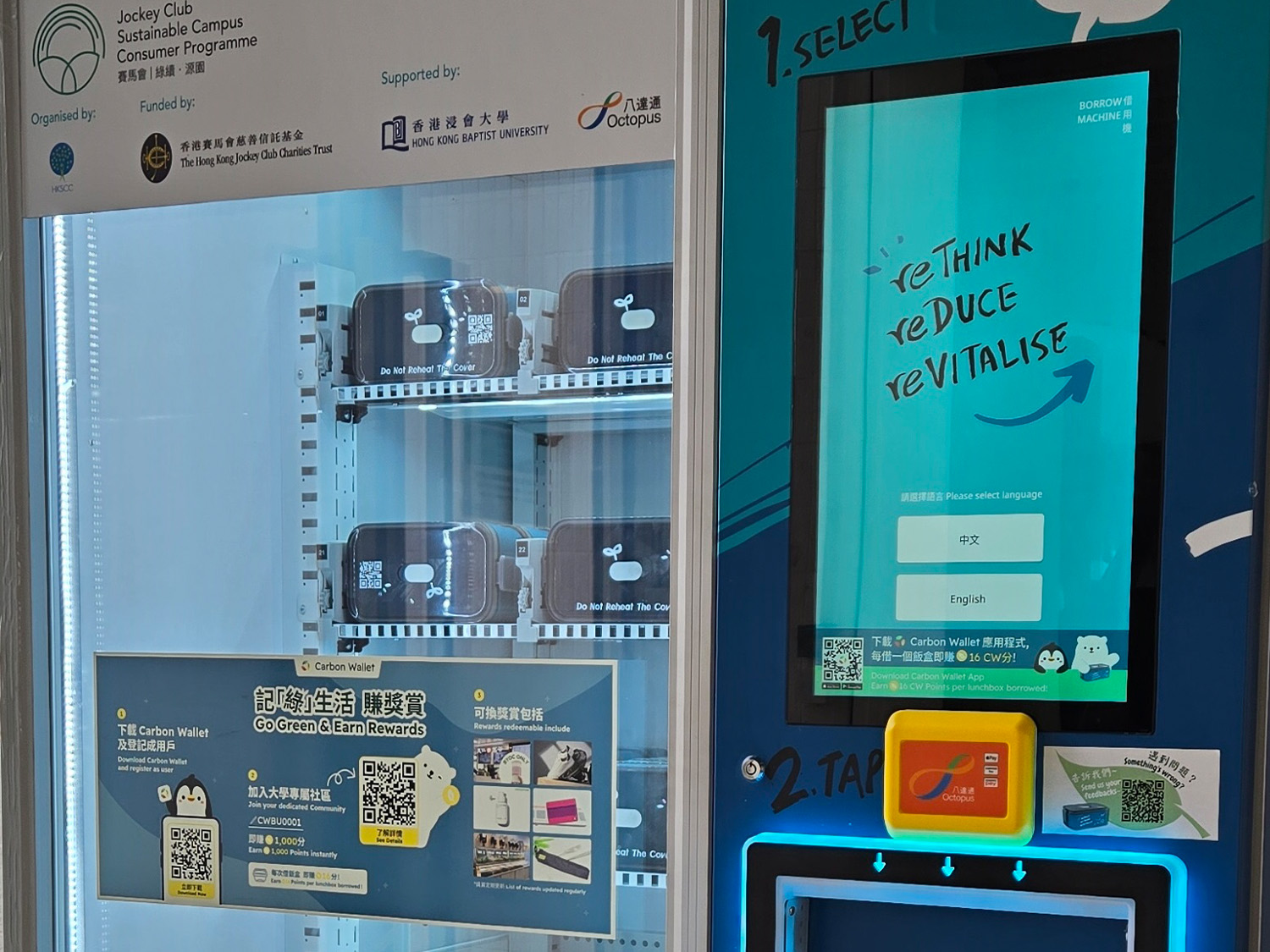

- Sustainability criteria in catering contracts
Ahead of the impending regulations on disposable plastic products enforced in April 2024, the University has strengthened sustainability criteria in its catering contracts, both for new providers and contract renewals. This includes a ban on disposable tableware for dine-in orders, prompting caterers to seek out more sustainable alternatives.
- Incentivising reusable options
The University offers rebates for “bring your own container" and "less rice" in various catering outlets, directly incentivising individuals to reduce single-use disposables and food waste. To ensure compliance with these sustainability guidelines, rigorous monthly catering inspections are conducted across all dining establishments on campus..
Participation in the Jockey Club Sustainable Campus Consumer Programme
Officially launched by the Hong Kong Sustainable Campus Consortium (HKSCC) in 2021, the Jockey Club Sustainable Campus Consumer Programme (JCSCCP) is a three-year initiative funded by the Hong Kong Jockey Club Charities Trust, focusing on the advancement on the SDG 12 across eight university campuses in Hong Kong.
- The 4th batch of Sustainability Leadership Programme
The JCSCCP has continued its Sustainability Leadership Programme, providing a valuable platform for students to explore sustainability topics and develop leadership skills. The 4th batch of the programme saw a team of five HKBU students launch the "SUITAINABLE" project. Through this initiative, the team sourced used business attire from staff members and organised a business wear rental service for students. Offered at a cost of HK$20 to $30 per piece, this service aims to assist students in preparing for job interviews and project presentations, while promoting sustainable fashion practices on campus.
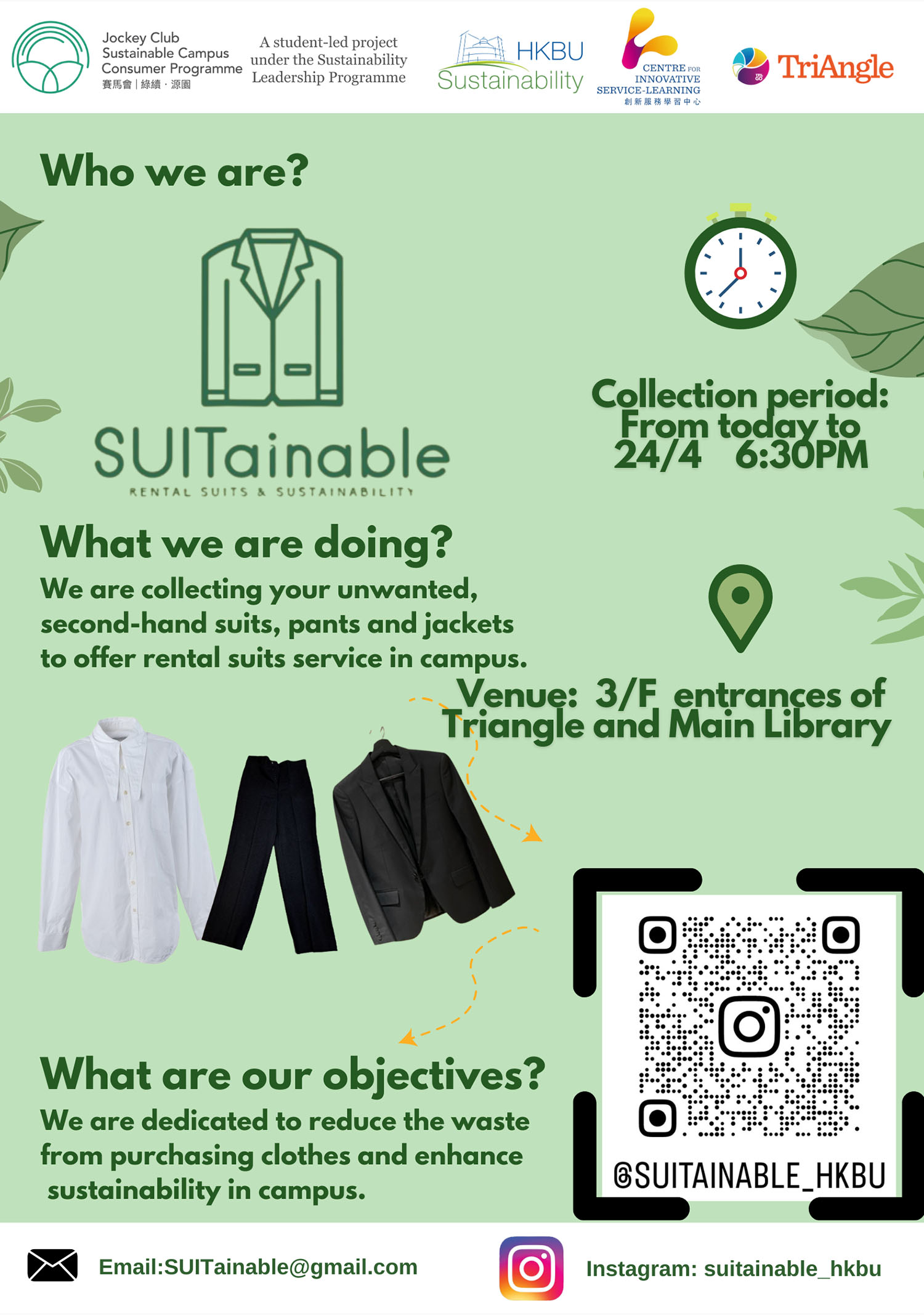

- The "Flip the Change" campaign
A collaborative sustainability initiative organised by the JCSCCP across several universities was introduced on the HKBU campus from 15 to 19 April 2024. The campaign aimed to raise awareness about disposable waste from takeout, highlight impending regulations on disposable plastic products, and promote the benefits of adopting a "Bring Your Own" approach. As part of the campaign, used disposable cups were collected to create a visual installation showcased at the participating universities before being recycled. Various social media platforms were utilised to sustain engagement, including a contest rewarding students who embraced sustainable practices during the campaign period.
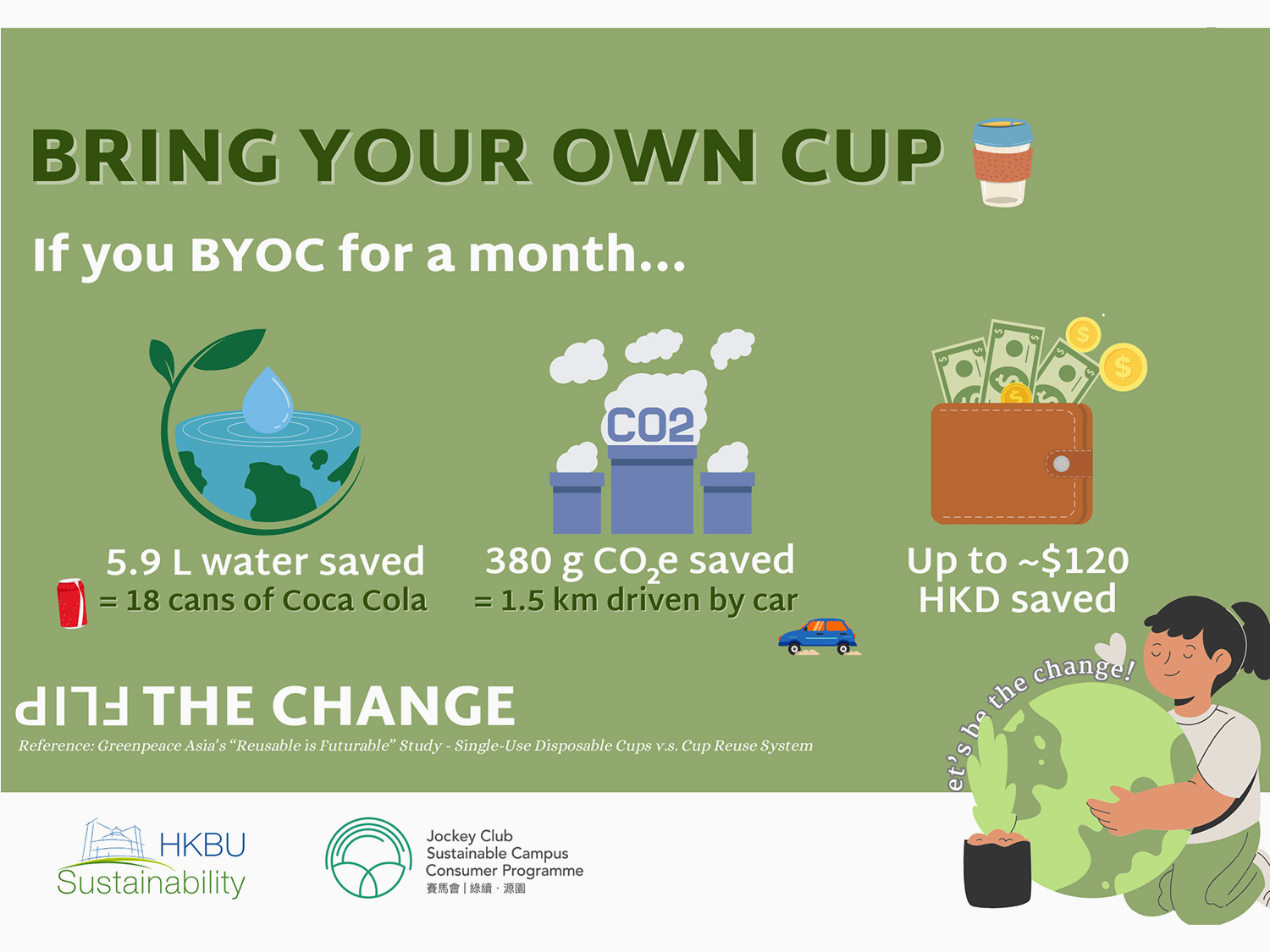

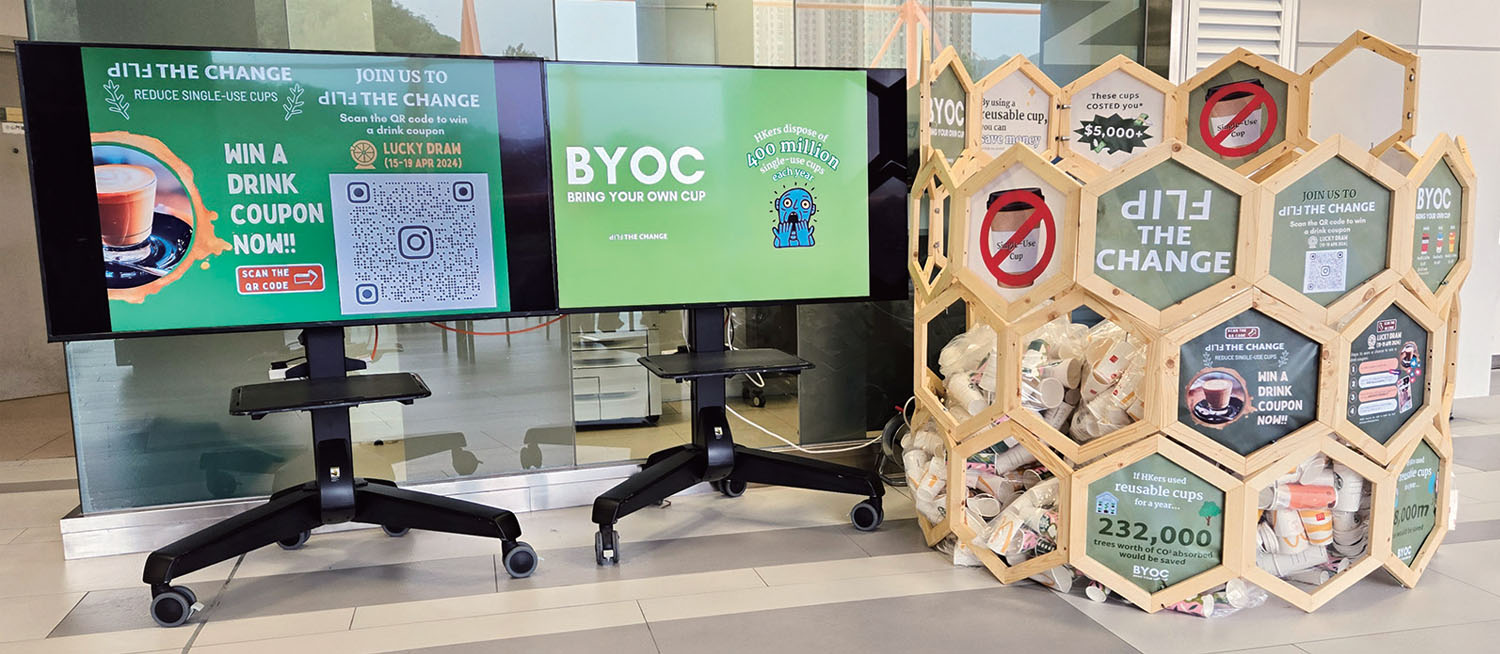

Promoting sustainable fashion
The University has taken proactive steps to promote sustainable fashion practices and foster a culture of mindful consumption within the campus community. Through collaborative initiatives and strategic partnerships, the University is leading the way in driving positive change and raising awareness about the environmental impact of the fashion industry
- Joint-U Clothing Swap Programme
A collaborative clothing swap event to promote sustainable fashion practices. The event, which took place in September 2023, aimed to drive changes in behaviour and knowledge regarding sustainable fashion. The programme facilitates clothing swaps and raises about sustainable consumption and production. Collection boxes for clothes were strategically placed across the campus, and a pop-up Clothing Swap Market was held to provide students and staff with opportunities to engage in eco-friendly fashion choices.
To synergise efforts in promoting sustainable fashion, the social enterprise Stote was invited to set up a booth alongside the Joint-U Clothing Swap event. Stote, which is dedicated to upcycling textile waste into fashionable accessories, showcased their innovative upcycling methods, reviving discarded materials and giving them a new lease on life. Additionally, a portion of the remaining clothes from the clothing swap event were donated to Stote for continued upcycling initiatives, highlighting the importance of sustainable practices and the value of partnerships in driving positive change.
- Participation in "Get Redressed Month"
Teaming up with the JCSCCP, the University participated in the campaign “Get Redressed Month 2024” organised by Redress. The campaign invited Hong Kong consumers to rethink the relationship between themselves, clothing, and the environment, and discover more sustainable ways to embrace fashion in their daily lives. To support the campaign, the University arranged clothing collection boxes on the campus in May 2024 and collected 48kg of clothes, which were mainly donated to charity groups for reuse and downcycling.
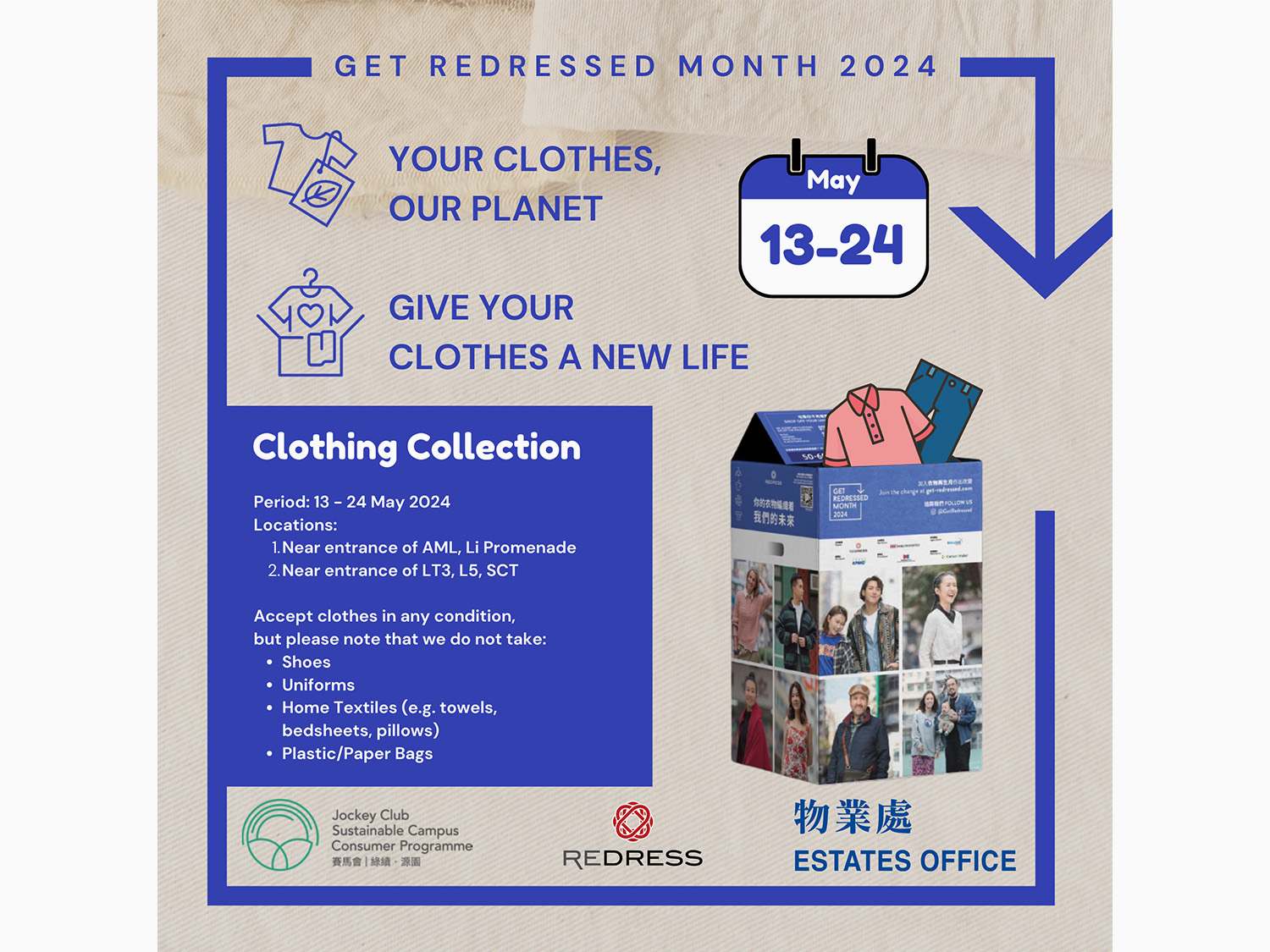

Empowering behavioural change through technology
The University has implemented various initiatives within student residence halls to encourage more responsible consumption patterns, leveraging technological solutions to empower behavioural change among the student community.
- Behaviour-activated showerheads
The residence halls are equipped with innovative behavior-activated showerheads that incorporate an LED system. This system changes colour every 10 liters of water used, providing a visual cue for users to monitor and manage their water usage during showers. Data on water consumption from these showerheads will be available on an IoT platform, enabling analysis of usage patterns.
- Real-time consumption dashboards
Complementing the hardware installations, real-time energy and water usage data are displayed on TV screens in the residential tower lobbies. This information-sharing initiative seeks to raise awareness among students and prompt them to actively monitor and adjust their consumption habits for a more sustainable lifestyle.
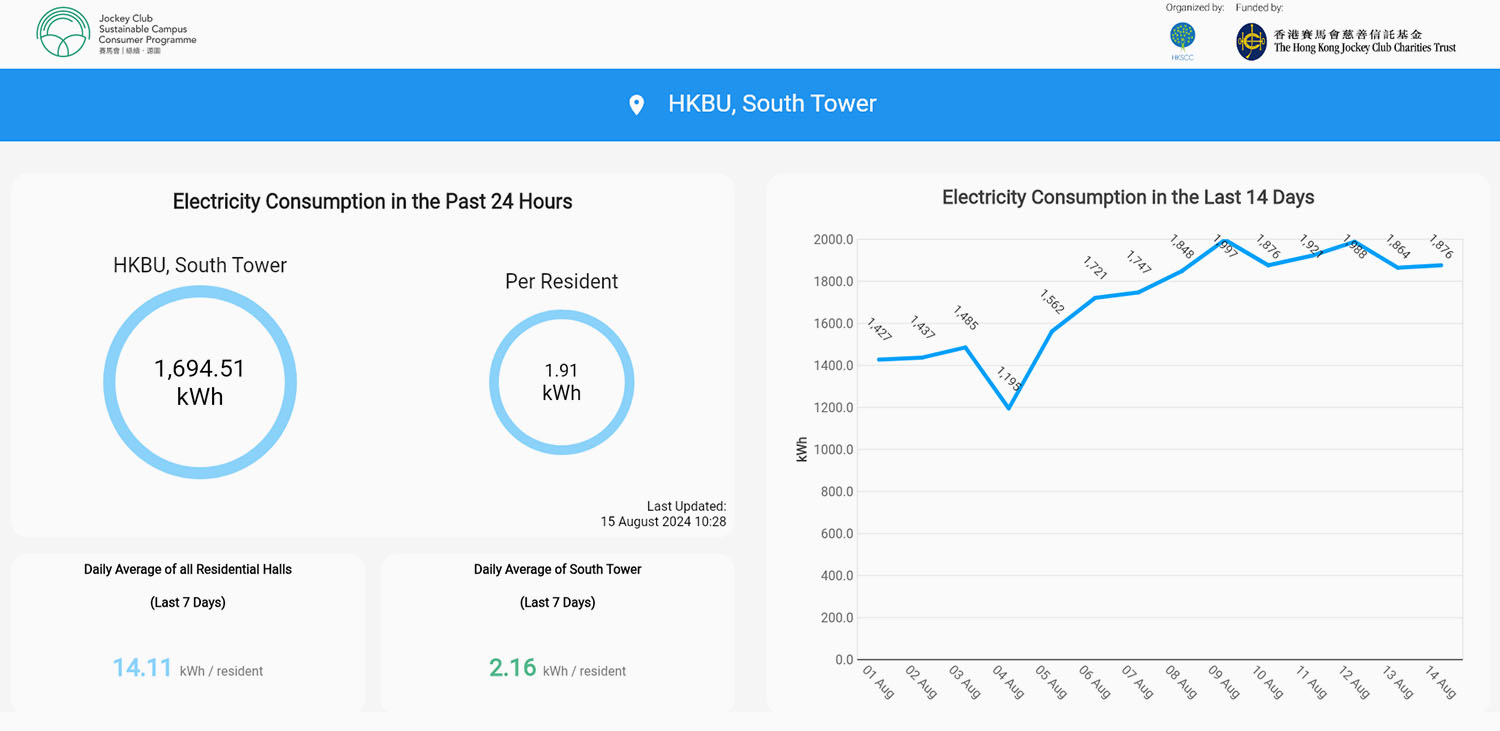

Performance indicators against baseline year
Compared to the baseline year of 2016-17, the performance of both municipal solid waste generation and the recyclables collection has shown improvement as a result of the implementation of various sustainability policies and projects.
| Performance indicators | 2023-24 against baseline year (2016-17) | |
| Municipal solid waste | Per GFA (kg/sq.m.) | -12.60% |
| Per capita (kg/FTE) | -22.03% | |
| Recyclables | Per GFA (kg/sq.m.) | +172.43% |
| Per capita (kg/FTE) | +143.09% | |
